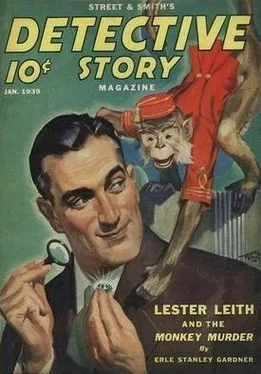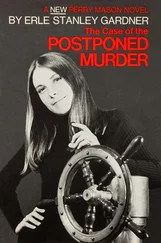Erle Stanley Gardner
The Monkey Murder
Lester Leith, his slender, well-knit form attired in a cool suit of Shantung pongee, sprawled indolently in the reclining wicker chair. The cool afternoon breezes filtered through the screened windows of the penthouse apartment. Leith’s valet, Beaver, nicknamed “Scuttle” by Lester Leith, ponderous in his obsequious servility, siphoned soda into a Tom Collins and deferentially placed the glass on the table beside his master’s chair.
If Leith had any knowledge that this man who served him, ostensibly interested only in his creature comforts, was in reality a police undercover man, planted on the job by Sergeant Arthur Ackley, he gave no indication. His slate-gray eyes, the color of darkly tarnished silver, remained utterly inscrutable as he stared thoughtfully at the bubbles which formed on the glass only to detach themselves and race upward through the cool beverage.
The valet coughed.
Leith’s eyes remained fixed, staring into the distance.
The police spy squirmed uneasily, then said: “Begging your pardon, sir, was there something you wanted?”
Leith, without turning his head, said, “I think not, Scuttle.”
The big undercover man shifted his weight from one foot to the other, fidgeted uneasily, then said: “Begging your pardon, sir, please don’t think I’m presumptuous, but I was about to venture to suggest— Well, sir—”
“Come, come, Scuttle,” Lester Leith said. “Out with it. What is it?”
“About the crime news, sir,” the undercover man blurted. “It’s been some time since you’ve taken an interest in the crime news, sir.”
Leith sipped his Tom Collins. “Quite right, Scuttle,” he said. “And it will probably be a much longer time before I do so.”
“May I ask why, sir?”
“On account of Sergeant Ackley,” Leith said. “Damn the man, Scuttle. He’s like a woman convinced against her will, and of the same opinion still. Somewhere, somehow, he got it through that fat head of his that I was the mysterious hijacker who has been ferreting out the criminals who have made rich hauls, and relieving them of their ill-gotten spoils.”
“Yes, sir,” the spy said. “He certainly has been most annoying, sir.”
“As a matter of fact,” Leith went on, “whoever that mysterious hijacker is — and I understand the police are firmly convinced there is such an individual — he has my sincere respect and admiration. After all, Scuttle, crime should be punished. Crime which isn’t detected isn’t punished. As I understand it, the criminals who have been victimized by this hijacker are men who have flaunted their crimes in the faces of the police and got away with it. The police have been unable to spot them, let alone get enough evidence to convict them. Then along comes this mysterious hijacker, solves the crime where the police have failed, locates the criminal, and levies a hundred-per-cent fine by relieving him of his ill-gotten gains. That, Scuttle, I claim is a distinct service to society.”
“Yes, sir,” the spy said. “Of course, you will admit that your charities for the widows and orphans of police and firemen killed in the line of duty, your donations to the associated charities and the home for the aged have been steadily mounting.”
“Well, what of it, Scuttle? What the devil has that to do with the subject under discussion?”
“Begging your pardon, sir, I think the sergeant wonders where you’re getting the money, sir.”
Lester Leith placed the half-empty glass back on the table, and reached for his cigarette case. “Confound the man’s impudence, Scuttle. What business is it of his where I get my money?”
“Yes, sir, I understand, sir. Oh, quite, sir. But even so, sir, if you’ll pardon my making the suggestion, sir, it seems that you shouldn’t let such a trivial matter interfere with your enjoyment of life.”
“My enjoyment of life, Scuttle?”
“Well, sir, I know that you always derived a great deal of pleasure from looking over the crime clippings. As you’ve so frequently remarked, you used to feel that a man could study the newspaper accounts of crime and in many cases spot the guilty party, just from the facts given in the newspapers.”
“I still maintain that can be done, Scuttle.”
“Yes, sir,” the spy said, lowering his voice. “And has it ever occurred to you, sir, that what Sergeant Ackley doesn’t know won’t hurt him?”
“Won’t hurt him,” Lester Leith exclaimed. “It’s what Sergeant Ackley doesn’t know that’s ruining him! If knowledge is power, Sergeant Ackley has leaky valves, loose pistons, scored cylinders, and burnt-out bearings. He’s narrow-minded, egotistical, suspicious, mercenary, selfish, and pig-headed. In addition to all of which, Scuttle, I find that I don’t like the man.”
“Yes, sir,” the spy said, “but if you’d only interest yourself in the crime clippings just once more, sir, I have several very interesting items saved up for you. And Sergeant Ackley would never know, sir.”
Leith said reprovingly, “Scuttle, you’re trying to tempt me.”
“I’m sorry, sir. I didn’t mean to... that is, really, sir. Well, of course, you may depend upon my discretion, sir.”
Leith half turned in his chair. “I can trust you, Scuttle?” he asked, looking at the spy with his inscrutable silver-gray eyes.
“Absolutely, sir, with your very life, sir.”
Lester Leith sighed, settled back, and tapped a cigarette on a polished thumbnail. “Scuttle,” he said, “perhaps it’s my mood, perhaps it’s the weather, perhaps it’s the drink; but I’ve decided to indulge in my hobby just once more, only mind you, Scuttle, this time it will be merely an academic pursuit. We’ll merely speculate on who the criminal might be and keep that speculation entirely to ourselves, a sacred confidence within the four walls of this room.”
“Yes, sir,” the spy said, quivering with eagerness as he pulled a sheaf of newspaper clippings from his pocket.
“Sit down, Scuttle,” Leith invited. “Sit down and make yourself comfortable.”
“Very good, sir. Thank you, sir.”
Lester Leith snapped a match into flame, held it to the tip of the cigarette, and inhaled deeply, extinguishing the match with a single smoky exhalation.
“Proceed, Scuttle,” he said.
“Yes, sir. The affair of the Brentwood diamond seems to have been made to order for you, sir.”
“Made to order for me . Scuttle?”
“Yes, sir,” the undercover man said, forgetting himself for the moment as he perused the newspaper clipping. “The police have never found the culprit. There’s a chance for you to make a good haul and—”
“Scuttle!” Lester Leith interrupted.
The valet jumped. “Oh, I beg your pardon, sir. I didn’t mean it in that way, sir. What I meant—”
“Never mind, Scuttle. We’ll pass the Brentwood diamond. What else do you have?”
“That was the main one, sir.”
“Well, forget it, Scuttle.”
The spy thumbed through the clippings.
“There’s the man who was choked and robbed of some two thousand dollars he’d won at gambling.”
“Skip it, Scuttle,” Lester Leith interrupted. “A man who wins two thousand dollars at gambling, and hasn’t sense enough to go to a downtown hotel and stay there until daylight, deserves to lose his winnings. That’s an old gambling-house trick. What else do you have?”
“There was the woman who shot her husband and claimed—”
“Tut, tut, Scuttle,” Lester Leith said.
“You’ve been reading the tabloids again. That is completely stereotyped. She shot him because he had forfeited her respect. She shot him because she couldn’t demean herself to accept the status in life which he thought a wife should have. She had been married ten years, but she made the revolting discovery of his baser instincts at a time when a revolver happened to be handy. She snatched it from her purse, thinking only to bring him to his senses, and then she can’t remember exactly what happened. She thinks he started for her, and everything went blank. She felt the recoil of the revolver as it roared in her hand. Then she couldn’t remember anything until she found herself at the telephone notifying the police. That was right after she’d slipped out of her house dress and put on her best outfit.”
Читать дальше












